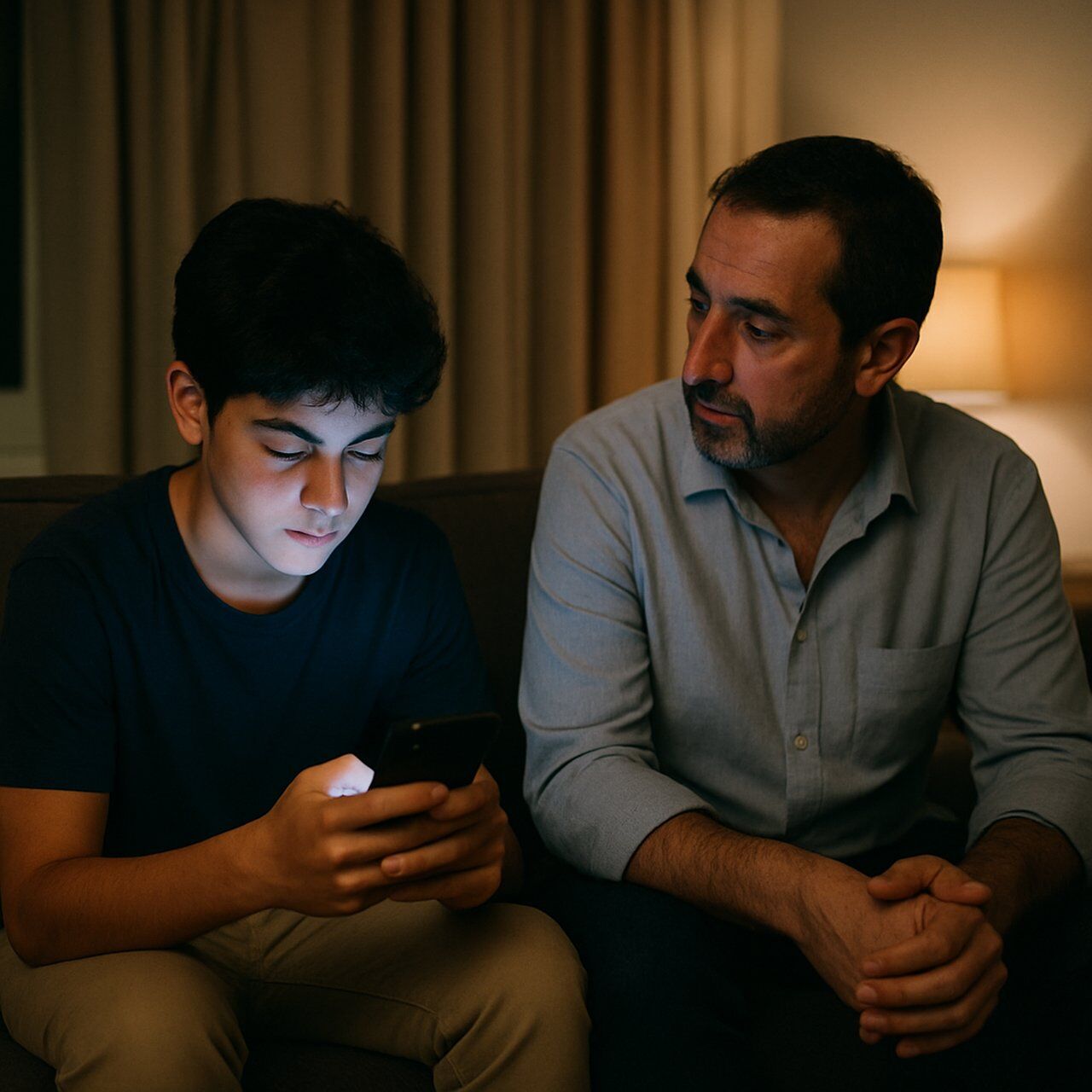Remember when we thought television would rot our brains? Those were simpler times. As parents we now strap the entire internet to our kids’ faces and hope for the best. The glow of the phone is everywhere – at the dinner table, under the covers, even while a teenager is supposed to be looking at the road. Our inner teenager rolls their eyes when we complain, but emerging research is giving us a few solid reasons to worry – and a few surprising strategies to consider.
A study from the University of Pittsburgh School of Medicine, published in JAMA Pediatrics in June 2025, dug into what happens inside the developing brain when kids stare at screens. Researchers surveyed more than 1,000 adolescents about how many hours they spend on phones and how much they sleep, then looked at their brain scans. The connection between screen time and depression isn’t simply “more time equals more misery.” The Pitt team found that kids who spent long hours on phones **and** slept poorly had messier brain “highways” — the white‑matter connections that govern memory, attention and emotion were weaker. Those teens also scored higher on measures of depression. In other words, it isn’t just the total hours, it’s the way screens steal sleep. The lead author compared white matter tracts to highways: without rest, they crumble.
That nuance matters because it changes the conversation we have at home. Yanking the phone away at 8 p.m. may help, but timing and content matter too. Scrolling memes in the afternoon doesn’t do the same damage as doomscrolling in bed. And, critically, the researchers caution that “taking away all digital media is not the answer”. Digital media keeps kids connected and informed; the trick is making sure it doesn’t invade the hour before sleep. (And yes, we might have to model that ourselves – how’s your late‑night doomscrolling going?)
A second study published days earlier, led by Weill Cornell Medicine and Columbia University, looked at “addictive trajectories” – patterns of compulsive social media, phone or gaming use tracked over four years. Simply spending lots of time on screens wasn’t what predicted trouble. Teens whose phone use became more compulsive – they felt distress when not using it or used it to escape problems – were **two to three times** more likely to experience suicidal thoughts, anxiety or depression. The authors noted that limiting phone use for part of the day doesn’t necessarily reduce risk; if anything, it may reinforce the compulsion. Treating the behavior like other addictions might be more effective. For parents, that means paying attention not only to the clock but to the mood and motive behind the scrolling.
While researchers in the U.S. crunch data, Egyptian officials are drawing the same conclusions from the field. In January the Ministry of Health and Population’s Scientific Committee on the Mental Health of Children and Adolescents reviewed its progress on adolescent mental health campaigns. Officials warned that addiction to social media and online games has become one of the most serious issues facing Egyptian youth. Their strategy includes early detection and prevention in schools and clubs, counseling via a national mental‑health platform and a hotline. The initiative treats internet addiction as a disease requiring prevention, intervention and rehabilitation. Reading that as a parent in Cairo hits differently – it’s not just my household’s bedtime battle; it’s a nationwide concern.
And if you need another wake‑up call (pun intended), consider that a July study found teen drivers spend an average **21 percent** of each trip staring at their smartphones. Over a quarter of those glances lasted two seconds or longer, which is long enough to cause a crash. Most of those checks were for entertainment and texting. In other words, screen addiction isn’t just a mental‑health issue – it’s literally life and death on the road. Researchers recommend using Do Not Disturb mode and keeping phones out of reach while driving. You can bet that advice showed up in my own carpool lecture this week.
So what do we do? Start by talking. Our teens need to understand that screens aren’t evil, but they have to be managed. Focus on what they’re doing on their devices and why – are they connecting with friends or escaping chores? Set an agreed‑upon bedtime for the phones, and maybe for you too. Make the hour before sleep a sacred, screen‑free zone. Encourage them to use “Do Not Disturb” when driving and, please, do the same yourself. If you notice compulsive behavior – distress when the phone is gone, constant checking – don’t assume a time‑out will fix it. The Egyptian initiative treats addiction like a health issue; that mindset can help at home too. Sometimes we need outside help.
Parenting in the smartphone era is messy. We’re the first generation to negotiate chores and screen time with kids who’ve never known a world without Wi‑Fi. The research isn’t here to shame us; it’s a flashlight to help guide the way. Use it to have better conversations with your teen, to set boundaries that make sense and to remember that the goal isn’t a screen‑free childhood – it’s a healthy, balanced one. Our kids might roll their eyes now, but someday they’ll thank us (or at least they’ll put their phones down long enough to try).
Sources: University of Pittsburgh School of Medicine report on screen use and brain development; Weill Cornell Medicine study on addictive screen use and suicide risk; Egypt’s Ministry of Health review of adolescent mental‑health campaigns; U.S. News report on teen drivers and smartphone distraction.







Leave a Reply
You must be logged in to post a comment.